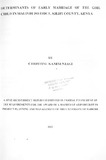| dc.contributor.author | Njagi, Christine K | |
| dc.date.accessioned | 2012-11-28T12:28:12Z | |
| dc.date.available | 2012-11-28T12:28:12Z | |
| dc.date.issued | 2012 | |
| dc.identifier.uri | http://erepository.uonbi.ac.ke:8080/xmlui/handle/123456789/7287 | |
| dc.description.abstract | Early marriage remains a widely ignored violation of the health and development rights of girls and young women. Early marriage is culturally packaged as a social necessity, but in many cases this amounts to socially licensed sexual abuse and exploitation of a child. It is considered to be one of the most persistent forms of sanctioned sexual abuse of girls and young women. The purpose of this study was to identify the determinants of early marriage in Malindi District, Kilifi County. The study sought to find out how poverty, gender inequality, socio-cultural practices and education contribute to early marriage of the girl child.
The research adopted a descriptive survey research design which enabled the researcher to capture information about attitudes of the respondents that are otherwise difficult to measure using observational. techniques. The main instrument used for data collection was a questionnaire due its practicability in terms of reaching a large number of respondents.
The study had a sample size of 218 women below the age of 18 years and 10 key informants. The data collected was coded and analyzed using SPSS and presented in frequency tables. The findings of the study showed that poverty was ranked as the highest reason behind early marriage. Gender inequality was also seen to contribute to early marriage. This was evidenced by the disparity in age at the time of marriage between men and women thus proving that early marriage affects girl more than boys. Fear of stigma was also found to contribute to early marriage whereby young girls rushed to get married as a result of early pregnancy. Low level of education was found to cut across different generations thus leading to early marriage as education is not valued by the community.
The study recommended that there is a need to urgently address the high poverty levels in Malindi District which was found to be the main reason behind early marriage. Girls should also be accorded equal opportunities for advancement rather than being sacrificed for their families. Finally, sensitization on the importance and benefits of education should be carried out to help alleviate the high poverty levels in Malindi District. | en_US |
| dc.language.iso | en_US | en_US |
| dc.publisher | University of Nairobi, Kenya | en_US |
| dc.title | Determinants of early marriage of the girl child in Malindi District, Kilifi County, Kenya | en_US |
| dc.title.alternative | Thesis (MA) | en_US |
| dc.type | Thesis | en_US |

